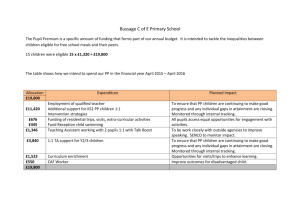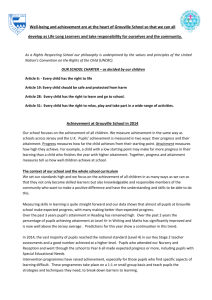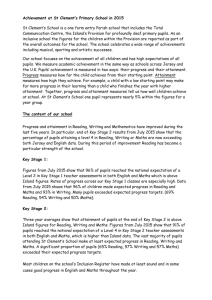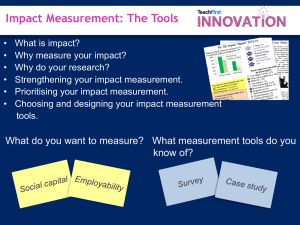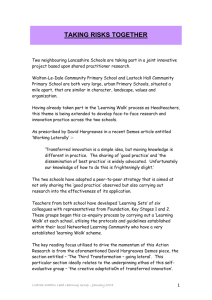Achievement at Bel Royal School in 2014 Our school focuses on the
advertisement
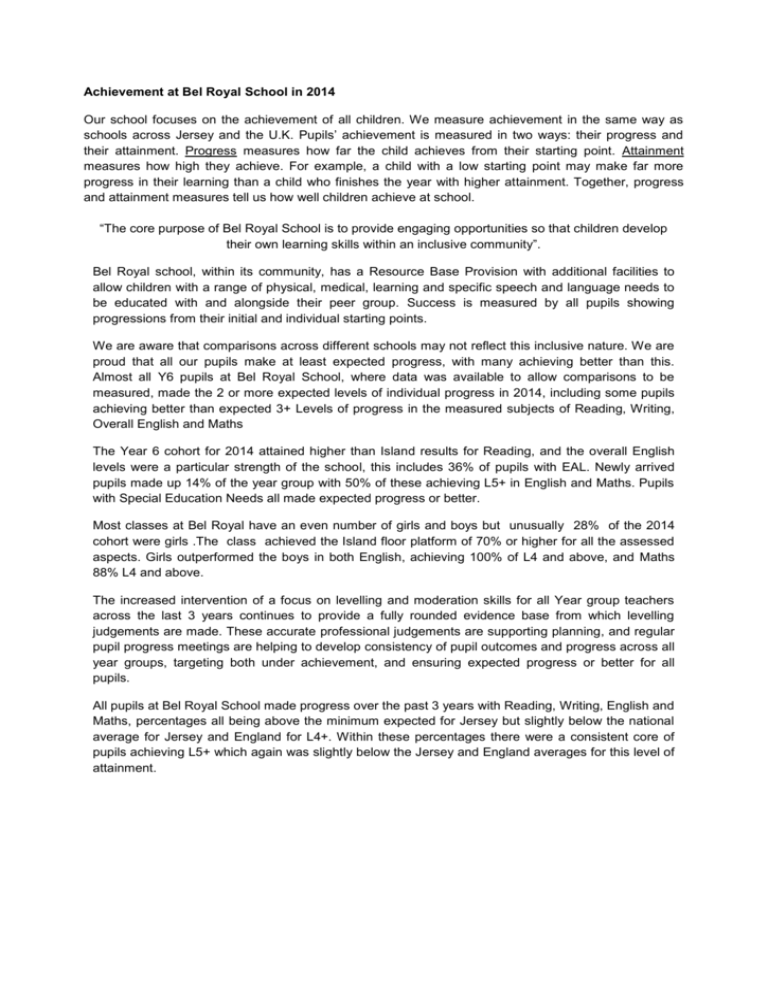
Achievement at Bel Royal School in 2014 Our school focuses on the achievement of all children. We measure achievement in the same way as schools across Jersey and the U.K. Pupils’ achievement is measured in two ways: their progress and their attainment. Progress measures how far the child achieves from their starting point. Attainment measures how high they achieve. For example, a child with a low starting point may make far more progress in their learning than a child who finishes the year with higher attainment. Together, progress and attainment measures tell us how well children achieve at school. “The core purpose of Bel Royal School is to provide engaging opportunities so that children develop their own learning skills within an inclusive community”. Bel Royal school, within its community, has a Resource Base Provision with additional facilities to allow children with a range of physical, medical, learning and specific speech and language needs to be educated with and alongside their peer group. Success is measured by all pupils showing progressions from their initial and individual starting points. We are aware that comparisons across different schools may not reflect this inclusive nature. We are proud that all our pupils make at least expected progress, with many achieving better than this. Almost all Y6 pupils at Bel Royal School, where data was available to allow comparisons to be measured, made the 2 or more expected levels of individual progress in 2014, including some pupils achieving better than expected 3+ Levels of progress in the measured subjects of Reading, Writing, Overall English and Maths The Year 6 cohort for 2014 attained higher than Island results for Reading, and the overall English levels were a particular strength of the school, this includes 36% of pupils with EAL. Newly arrived pupils made up 14% of the year group with 50% of these achieving L5+ in English and Maths. Pupils with Special Education Needs all made expected progress or better. Most classes at Bel Royal have an even number of girls and boys but unusually 28% of the 2014 cohort were girls .The class achieved the Island floor platform of 70% or higher for all the assessed aspects. Girls outperformed the boys in both English, achieving 100% of L4 and above, and Maths 88% L4 and above. The increased intervention of a focus on levelling and moderation skills for all Year group teachers across the last 3 years continues to provide a fully rounded evidence base from which levelling judgements are made. These accurate professional judgements are supporting planning, and regular pupil progress meetings are helping to develop consistency of pupil outcomes and progress across all year groups, targeting both under achievement, and ensuring expected progress or better for all pupils. All pupils at Bel Royal School made progress over the past 3 years with Reading, Writing, English and Maths, percentages all being above the minimum expected for Jersey but slightly below the national average for Jersey and England for L4+. Within these percentages there were a consistent core of pupils achieving L5+ which again was slightly below the Jersey and England averages for this level of attainment. Progress between Key Stage 1 (Year 2) and Key Stage 2 (Year 6) 2014 Percentage (%) of pupils making more than expected progress (3+ Levels) Percentage (%) of pupils making expected progress (2+ Levels) Subject Reading School Jersey School Jersey 94 Subject Reading 96 17 39 Writing 74 94 Writing 17 37 English 91 95 English 13 38 Maths 83 93 Maths 35 37 Pupils are expected to make two levels of progress between the end of Key Stage 1 and the end of Key Stage 2 Attainment at the end of Key Stage 2 (Year 6) 3 Year Average 2012-2014 Percentage (%) of pupils achieving attainment level 4+ Subject Reading School Jersey England 83 90 Writing 71 English Maths Percentage (%) of pupils achieving attainment level 5+ School Jersey England 88 Subject Reading 29 44 48 84 83 Writing 18 31 31 78 89 N/A English 26 40 N/A 71 87 87 Maths 31 37 42 Level 4 represents attainment at the expected national standard for end of Key Stage 2 Level 5 represents attainment above the expected national standard for end of Key Stage 2




